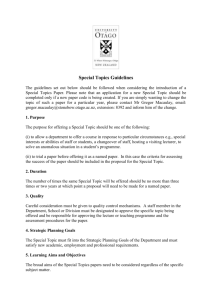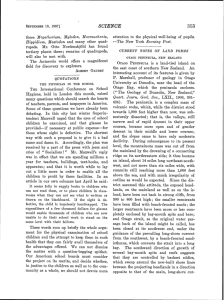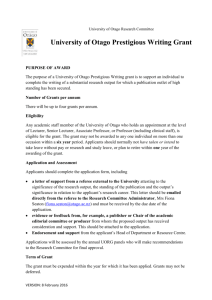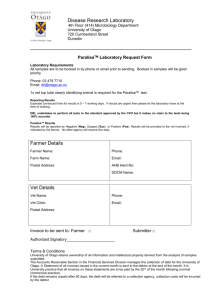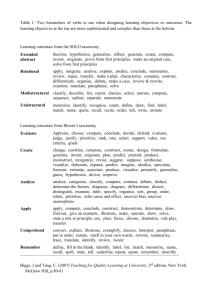University of Otago Research Grants
advertisement
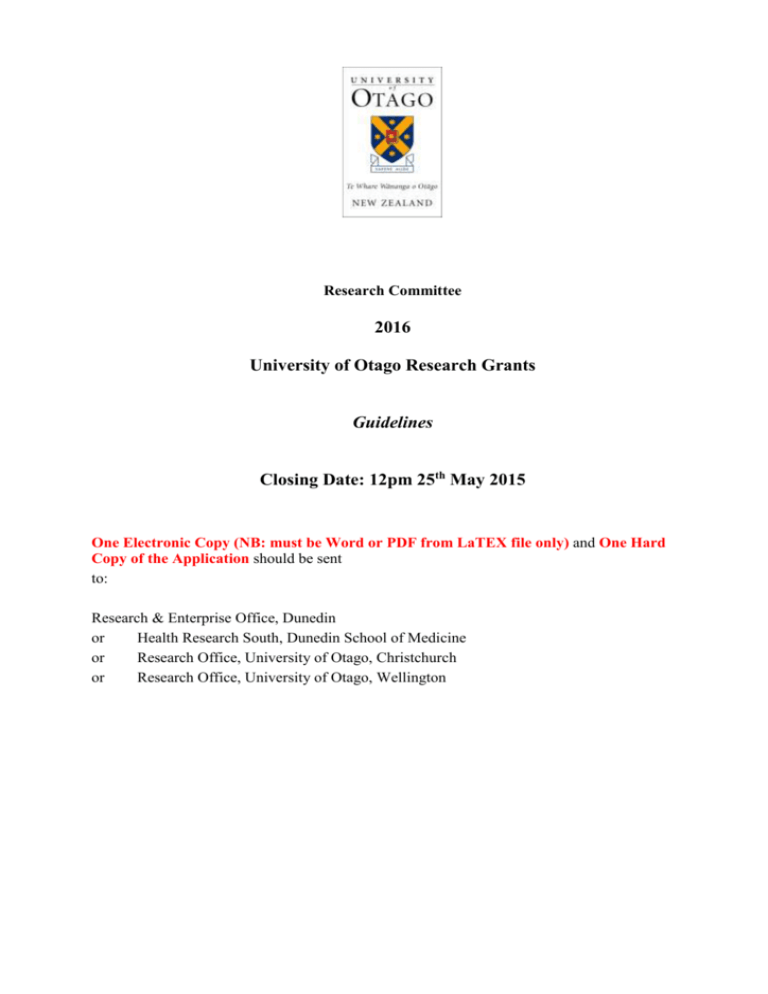
Research Committee 2016 University of Otago Research Grants Guidelines Closing Date: 12pm 25th May 2015 One Electronic Copy (NB: must be Word or PDF from LaTEX file only) and One Hard Copy of the Application should be sent to: Research & Enterprise Office, Dunedin or Health Research South, Dunedin School of Medicine or Research Office, University of Otago, Christchurch or Research Office, University of Otago, Wellington TIMETABLE Date Late-March 2015 Mid-April – 18 May 2015 12 pm, 25 May 2015 Process Release of Forms and Guidelines. Draft applications and Costing and Consents Worksheets to be submitted to Research Advisors for comment. Final Application, both electronic (Word File or PDF from LaTEX only) and hard copy and CCW must reach the appropriate Research Advisor at Research & Enterprise Dunedin (Centre for Innovation), DSM, UOC or UOW. Applications and CCWs must be signed by the Applicant and the HOD. Aug 2015 Discipline Panels meet and make provisional recommendations. 16 Sept 2015 Research Committee makes final assessment and recommendations for funding for each application. (Revised budgets & objectives may be requested where applicable) Oct 2015 Notification of results for successful awards. 1 Jan 2016 Accounts opened after all ethics and other approvals received by Research and Enterprise Office. 31 Mar 2017 No expenditure can be processed after this date for one-year projects. Accounts closed. 30 June 2017 Annual Project Report received by Research & Enterprise Office. University of Otago Research Grant Guidelines revised March 2015 1 CONTACTS Enquiries concerning application procedures and guidelines Research Advisors Division of Commerce, CSAFE Gabrielle Hine (03) 479 5934 or 021 229 0639 gabrielle.hine@otago.ac.nz Division of Health Sciences Anatomy, Dentistry, Physiology Eric Lord (03) 479 4592 or 021 279 4592 eric.lord@otago.ac.nz (03) 479 4043 or 021 024 37971 diana.rothstein@otago.ac.nz Pharmacy, Physiotherapy, DSM Prev. & Social Medicine – Centre for International Health, Nga Tahu Maori, Cancer Soc. Social & Behavioural Research Unit; Dental School (shared with Eric Lord) Diana Rothstein Microbiology & Immunology, Pharmacology & Toxicology Melony Black (03) 479 4591 or 027 404 6106 melony.black@otago.ac.nz Biochemistry, Medicine (DSM), Pathology (DSM), Surgical Sciences (DSM) Edwin Meijerink (03) 479 4190 or 021 279 5085 edwin.meijerink@otago.ac.nz General Practice & Rural Health, Psych. Medicine,Women’s & Children’s Health, Prev. & Social Medicine Ali Cameron (03) 470 9030 or 33 9030 ali.cameron@otago.ac.nz Division of Humanities, Bioethics Centre Marjolein Righarts (03) 479 4173 or 021 279 4173 marjolein.righarts@otago.ac.nz Division of Sciences Applied Sciences, Chemistry, Computer Science, Food Science, Human Nutrition, Mathematics & Statistics, Physical Education, Physics, Psychology Kate Berard (03) 479 8484 kate.berard@otago.ac.nz Botany, Geology, Marine Science, Zoology, School of Surveying Amanda-Jane (AJ) Woodhouse (03) 479 7717 or 021 407074 aj.woodhouse@otago.ac.nz University of Otago, Christchurch Karen Chaney (03) 364 1593 karen.chaney@otago.ac.nz (03) 378 6370 kosta.tabakakis@otago.ac.nz Kosta Tabakakis University of Otago, Wellington Christine Groves (04) 918 6855 or 021 279 5541 christine.groves@otago.ac.nz Research Committee Administrator Fiona Seaton (03) 479 5967 fiona.seaton@otago.ac.nz University of Otago Research Grant Guidelines revised March 2015 2 Summary of Changes to 2015 Guidelines The following pages contain changes to the Guidelines. These are highlighted with the words ‘New’ next to the change. Change Application Form Travel Reimbursement University of Otago Research Grant Guidelines revised March 2015 Page 5 17 18 3 CONTENTS Timetable Contacts Summary of Changes Primary purpose Number of Applications, Length of grants Eligibility Staff eligibility Early Career Staff eligibility Research and Study Leave, Retirement, Leave Without Pay, Resignation Research eligibility Financial limitations Assessment Assessment Panels Assessment Criteria The Application Form General information Electronic Application Forms, Costing Worksheets, Māori Consultation, Ethics Section Guidelines Section 1 – Research Question, Background and Objectives Section 2 – Research Design and Methods Section 3 – Strategic Outcomes, Impact and Outputs Section 4 – Research Team Track Record Section 5 –Budget: Details and Justification Section 6 – Signatory Page Budget Notes Staffing and Salaries (including postgraduate students & postdocs) Consumables and minor equipment Specialised Equipment Travel Koha Items not normally funded Antarctic Research and Out-of-Season UORG Applications Antarctic Research Out-of-Season UORG Applications Award Conditions Length of grants Notification of Success Statutory and Regulatory Consents and Approvals Annual reporting requirements Publication Acknowledgment UORG Account Close-offs University of Otago Research Grant Guidelines revised March 2015 1 2 3 5 5 6 6 6 8 8 10 10 11 11 12 12 12 14 14 15 16 16 16 17 17 18 19 20 20 20 21 21 21 21 21 22 22 4 PRIMARY PURPOSE The primary purpose of the University of Otago Research Grant (UORG) scheme is to support excellence in research and scholarship at the University of Otago in line with the objectives of the University’s 2020 Strategic Research Imperative (http://www.otago.ac.nz/otago053226.pdf). The University of Otago Research Grant application process has the following purposes: 1. To support fundamental/ ‘blue-skies’ research projects that have limited sources of external funding; 2. To provide funding for the initial or additional scoping or pilot stages of novel and innovative research prior to approaching, or on the advice of, external funding sources; 3. To encourage the pursuit of research that will translate into benefit for society. NUMBER OF APPLICATIONS Only one application will be accepted from any eligible staff member as the principal investigator and no more than two other applications as an associate investigator. Any researcher who is not a principal investigator may be an associate investigator on a maximum of three applications. The principal investigator is required to make a time commitment on the application of at least 0.10 FTE. NEW: The Research Committee has instigated a new grant for 2016 – the University of Otago Prestigious Writing Grant (UOPWG). Applicants may apply for either a UORG or a UOPWG but not both grants in any one year. For details about the UOPWG, see (link http://www.otago.ac.nz/research/forms/UORG_University_of_Otago_Research_Grants/) LENGTH OF GRANTS Applications may be submitted for one, two, or three year projects. The proposal must outline the work that will be completed in each year as the Research Committee may decide to fund the grant in part or only for the first year of work. University of Otago Research Grant Guidelines revised March 2015 5 ELIGIBILITY STAFF ELIGIBILITY Eligible staff members who have held UORG grants as Primary Investigators in both of the immediate two prior rounds to this application, may not apply as a PI in this grant round. Such staff members may apply as Associate Investigators this round for grants that will commence in 2016 and will be eligible to apply as Primary Investigators in 2016, for grants that will commence in 2017. The definition of an Eligible Staff member is: either University staff holding academic positions which are considered PBRF eligible (typically Senior Teaching Fellows, Lecturers and above) and are funded fully or partly (at least 0.2 FTE) from the University block grant, and whose appointment at the University of Otago (previous and future) is at least 4 consecutive years. or Research-only staff members who are, at the time of application, at least 0.5FTE (e.g. Research Fellows, Senior Research Fellows, Research Professors/Associate Professors) and are considered PBRF eligible and whose previous funding and confirmed future funding as a 0.5FTE researcher at the University of Otago is at least 4 consecutive years. Any queries regarding eligibility should be directed to your Research Advisor before submission. Also see the flow-chart on the following page. EARLY CAREER STAFF ELIGIBILITY Special consideration is given to Early Career Staff members. The definition of an Early Career Staff member is an eligible staff member whose first appointment to the equivalent of a PBRF eligible position at any university or research institute was within the six years preceding July 1, 2015. (Time spent on parental leave or in non-research related activity is excluded from the yearly count of research experience). Applicants may apply as Early Career Principal Investigators, even if they have been previously awarded a UORG grant and provided that they still meet the early career definition. Early Career Principal Investigators are encouraged to work with a mentor or a wider group to provide feedback and advice on their proposal. A mentor must be named on the front page of the application. RESEARCH AND STUDY LEAVE, RETIREMENT, LEAVE WITHOUT PAY, RESIGNATION The staff member should not plan to retire or resign during the year for which the funding is sought. If RSL is planned, the applicant must explain how the funding for the proposed research is distinct from any Departmental, Divisional or external funds that have been received or will be University of Otago Research Grant Guidelines revised March 2015 6 applied for RSL. If leave without pay is planned, the applicant must indicate how the research will be managed. University of Otago Research Grant Guidelines revised March 2015 7 Diagram 1: Am I Eligible to Apply as PI on a 2016 UORG? University Staff member holding academic position – PBRF Eligible? Research-only staff - Research Fellows and above- PBRF Eligible? NO NO YES YES Fully funded or partly (at least 0.2 FTE) from the University block grant? Appointment at the University of Otago (previous and confirmed future) is at least 0.5 FTE and is at least 4 consecutive years? Yes YES Appointment at the University of Otago (previous and future) is at least 4 consecutive years? YES NO NO Had UORG as PI over each of immediate two previous grant rounds? YES NO Planning to retire, resign, take leave without pay during the year for which the funding is sought? NO YES Eligible to apply Not eligible to apply Diagram 2: Am I Early Career? First appointment to a PBRF eligible position at any institution was within the six years preceding July 1, 2015 NO Had previous UORG? YES NO Not eligible as early career staff Eligible as early career staff University of Otago Research Grant Guidelines revised March 2015 8 RESEARCH ELIGIBILITY The project should be distinct from the applicant’s research projects funded by external research agencies or internal sources (e.g. Departmental or Divisional). UORG funding does NOT cover shortfalls in external funding. There may be instances when there is a strong justification for supplementary UORG funding such as when early career or new staff are establishing a research platform or research facility or if external industry co-funding is available. In such cases, the applicant must provide a justification for why the supplementary funding is required (including evidence of any industry support/leverage) and explain how the requested UORG funding would be used to supplement other funding. A UORG is intended to support the applicant’s own research project. Although graduate students may be employed to contribute to the research project, the achievement of the project should not depend on the efforts of graduate students whose own research is expected to be supported through the teaching Divisions. An exception is that an eligible staff member who is undertaking PhD study may apply for UORG funding in support of their PhD project. FINANCIAL LIMITATIONS The minimum limits for applications for University of Otago Research Grants which can be submitted to the Research Committee are determined according to the type and the discipline of research. Humanities Social Sciences & Business Physical Sciences Life Sciences Human & Biomedical Sciences Clinical and Public Health minimum limit - $ 2,500 minimum limit - $ 5,000 lab/field based research, minimum limit - $10,000 non-lab/field based research, minimum limit - $5,000 For two or three-year applications, at least one of the years must meet the minimum requirement. Requests below the minimum limits will not be considered by the Research Committee. The average amount funded for the 2015 round was: CPH - $22,000; HBS - $36,500; HUM $8,500; LIF - $31,000; PHYS - $24,000; SSB - $17,000. It is very unlikely that applications exceeding $80,000 per annum will be funded. The proportion of funding for each panel will be determined by the proportion of funding requested. University of Otago Research Grant Guidelines revised March 2015 9 ASSESSMENT ASSESSMENT PANELS Applications will be assessed by six discipline panels as listed previously. These panels will be chaired by members of the Research Committee. If necessary, members may be co-opted to the Research Committee to fulfil these roles. The discipline panels will provide the Research Committee with a ranked list from which awards (allocated on a merit base) will be made. Applicants should complete the application, and nominate a single discipline panel. If additional expertise is required to assess the application, this will be sought by the Panel Chair during the assessment process. ASSESSMENT CRITERIA The panel will consider: the quality and clarity of the research proposal the novelty and innovation of the research the national or international significance and relevance of the proposed research Applications will be assessed on the following criteria (with weightings as indicated): 1. 2. 3. 4. Research Question, Background and Objectives Research Design and Methods Strategic Outcomes, Impact and Outputs Research Team Track Record % 30% 30% 20% 20% When your application is assessed it will be “graded” on each criterion on a scale from A+ to Ctaking into account the merit or compelling nature of the justification and the clarity of the information provided. University of Otago Research Grant Guidelines revised March 2015 10 THE APPLICATION FORM GENERAL INFORMATION 1. The application template (Word or LaTEX), Costing and Consents Worksheet (CCW) and other information are available electronically on the University website: http://www.otago.ac.nz/research/forms/. Use a font no smaller than Arial 10 point. Page limits must be adhered to. NB: The Panel reserves the right not to assess applications that do not meet these criteria. 2. Use language that a well-informed reader who is a non-specialist in the field will comprehend. Applications modified from applications submitted to external granting agencies (e.g. Marsden, HRC, MBIE) will normally need rewording for non-specialists. 3. A Costing and Consents Worksheet (CCW) is required for all applications. 4. An electronic draft of your application and CCW should be sent to your Research Advisor before 18th May 2015 for checking prior to obtaining signatures. 5. Māori consultation should be undertaken as part of the standard University process. Please refer to ‘Research Consultation with Māori’ on the University website http://www.otago.ac.nz/research/maoriconsultation/index.html 6. A copy of any required ethics and/or regulatory approvals must be forwarded to Research and Enterprise, before your account can be opened. Please contact your Research Advisor if you have any problems or queries. University of Otago Research Grant Guidelines revised March 2015 11 SECTION GUIDELINES The overall goal of the panel will be to assess whether the objectives address the research question and can be achieved over the time period of the research project. SECTION 1: RESEARCH QUESTION, BACKGROUND, OBJECTIVES (30%) NOTE: The combined page length of Section One and Section Two should not exceed three pages. References should not exceed one page and should follow Section Three. Use the standard full referencing method for your discipline area. The goal of this section should be to write a concise but adequate explanation of WHY you are undertaking this project, what you hope to achieve (in the short, medium and long term), the aims of this particular proposal and what sort of output you are expecting. 1. State a research question, hypothesis or any appropriate alternative that captures the central problem addressed by the research. This section should explain why the research question or hypothesis is original, insightful, rigorous, has national or international significance. 2. Explain the relationship between the research question and the background research literature. Clearly outline how the new directions and ideas in the proposal will extend or advance current knowledge in this area. 3. Explain the short, medium or long-term scholarly, scientific, technological, commercial, or policy-related objectives of the research. Explain how the research question or hypothesis is a key link, process or direction in achieving the overall objectives of the research proposal. SECTION 2: RESEARCH DESIGN, METHODS AND PLANNING (30%) 1. Describe your research design and methods giving details of how you intend to carry out the proposal, including statistical analysis (if applicable). 2. Explain why your chosen research design and methodology is the most appropriate to the proposal. You might discuss aspects such as alternate design theories, methodologies, value for money, techniques, practices or processes and whether your approach is consistent with, advances, or revises these approaches. 3. Provide a timeline of key activities, identifying who and what will be involved in each phase. 4. Provide evidence that the resources (such as time, specialised assistance, access to equipment) are available. 5. Show evidence of forward planning by including a description of any key activities, collaborations, processes, advice/consultation - including Māori consultation - that have already occurred prior to the proposal. SECTION 3: STRATEGIC OUTCOMES, IMPACT AND OUTPUTS (Limit: 1 page) (20%) 1. Describe the short, medium and/or long-term strategic outcomes that will result from this proposal and the local, national international impact and/or benefits of the research. This might include, for example: Better meeting the needs of end-users/audiences (cultural, business, social, educational, policy, health etc.), whether as a direct ‘user’ of your research or as developers or intermediaries who might take your research further. University of Otago Research Grant Guidelines revised March 2015 12 Changing your research trajectory to a strategically aligned new direction to take advantage of the opportunities in this new area. Working towards commercialisation of your research by developing intellectual property and/or marketable products or processes. Seeking funding from external organisations by piloting new methodologies; gathering additional data; developing new or strengthening research relationships, such as with government, business or community groups; validating a process or approach; better meeting the expectations of an external funder after advice. Developing or strengthening an inter/intra-disciplinary and/or trans-organisational research profile in an area of national/ international significance by undertaking a coherent set of aligned research investigations. [NB: For examples of outcome and impact statements see: http://www.ref.ac.uk/background/pilot/] 2. Describe the intended outputs of your research (e.g. publication, report, process, performance etc.) and where you intend to publish or disseminate your findings. University of Otago Research Grant Guidelines revised March 2015 13 SECTION 4: RESEARCH TEAM TRACK RECORD (20%) Each researcher's track record and CV will be evaluated relative to his/her career stage and it is the combined quality of these records including research outputs that will be assessed. 1. List all current internal or external funding, including research grants that have been applied for or received by all named investigators making a substantial contribution (ie 0.05% FTE or more) to the proposal. Note where these overlap with or are relevant to this application. This includes University, Divisional, Departmental or related applications submitted to the Equipment Committee as well as funding applied for or received from external funders such as HRC, Marsden, Lotteries etc. (NOTE: It is expected that where applicants are successful in being awarded alternative funding, UORG funding will be returned). 2. Give numbers of postgraduate students supervised and completed by the PI where the student commenced thesis research work after January 1, 2009. 3. CV: Please use the standard MBIE curriculum vitae template in Arial 12 point for each of the named research personnel (other than technical assistants or students) who is making a substantial contribution (i.e. 0.05FTE or more) to this application. If you wish, you may name collaborators within the body of the proposal, however their CVs are not required. (NOTE: Sections 2b-d should be completed if you intend the research to be used by endusers or are working towards commercialisation) SECTION 5: BUDGET DETAILS AND JUSTIFICATION (See Budget Notes below) The level of financial support will be influenced by your budget justification. Please provide a detailed budget for the research and justify the items included. Tasks for all staff (funded and non-funded) need to be explained here. Specify, if appropriate, any other funding sources that have been sought and provide details of additional funding already secured. Provide a Costing and Consents Worksheet (CCW). After completing the Costing and Consents Worksheet (CCW): Copy the requested information into the budget section of the application form. Transfer the figures from the summary table of the CCW to the front page of your application. List names and FTEs of all staff on the application form and CCW including any part-time and/or casual assistants. List Direct Salaries costed in the CCW, and entered in the application form. Show the appointment title level and, where known, the job title of the intended research staff, such as a Research Assistant Level 2. Provide a full description of the tasks of the research staff and fully justify the amount of work to be carried out by the research staff. Justify the proposed level of appointment and FTE contribution of the research staff. Justify general operating expenses, travel, and equipment directly related to the project. (Refer to budget notes on pages 13-15 for items that are/not fundable). List all amounts exclusive of GST. University of Otago Research Grant Guidelines revised March 2015 14 SECTION 6: SIGNATORY PAGE RSL/LEAVE WITHOUT PAY Indicate if you will be on study leave or leave without pay for a period longer than six weeks. If you are on RSL, briefly explain the difference between funding sought for this proposal and any funding made available through Department, Division or external sources. If you are on leave without pay, indicate the dates and how the research will be managed. Signatures The signatory page must be signed by the Principal Investigator to acknowledge that all information in the application is true and correct. The application must also be signed by the Head of Department (or Head of Resource Centre) to acknowledge that, should the application be approved, the basic resources will be made available. The Head of Department must also confirm whether the applicant meets the criteria of an Early Career Staff member. Where the Head of Department is the applicant, the appropriate Dean/PVC should sign the application. University of Otago Research Grant Guidelines revised March 2015 15 BUDGET NOTES 1. STAFFING AND SALARIES (INCLUDING POSTGRADUATE STUDENTS) Research-Only staff Principal Investigator applicants funded at less than 1.0 FTE, but at least 0.5 FTE at the time of their UORG application and during the term of the UORG, may apply for their own salary up to an additional 0.2 FTE. The FTE total of research-only staff should not add up to more than one FTE across all applications, including external research that is already contracted during the period of the UORG. In all cases, funding of applicants’ salaries must be fully justified and with a clear explanation. For salary costs: - use the estimated salary rates from the Research page on the University website http://www.otago.ac.nz/research/forms/2_SALARY%20SCALE%20PROJECTIONS/. 2016 salary rates are to be used for year one and 2017/2018 projected salaries for years two and three, if applicable. Factor in increases due to increments and promotions. - Include salary and salary-related costs (i.e. ACC and superannuation) for each direct salary in the application (now University policy for every application for research funding). The CCW defaults to the University Superannuation scheme. Note that salaries for casual staff must include an 8% annual leave entitlement as well as 0.52% for ACC and any relevant superannuation. Appointment of staff (both named and unnamed in the application) must be made within 2 months of the proposed appointment date or by 31 March 2016 if no appointment date is noted. If the requested staff position has not been filled, notify the Research and Enterprise Office. Failure to secure the services of suitably-qualified personnel may render the grant inoperable. Undertakings to staff should not be made until a grant is awarded. Contact the Human Resources Division (phone: (03) 479-8269) before advertising for and appointing staff to confirm employment and other details. Postdoctoral researchers funded at less than 1.0 FTE may apply for up to 0.5 FTE funding in the application provided that the UORG contract does not conflict with any other contracted requirements. Note the total commitments of a postdoctoral researcher must not be more than 1.0 FTE. 2. CONSUMABLES AND MINOR EQUIPMENT - Consumables and equipment under $2000 should be listed individually under operating expenses and fully justified. A listing in itself does not constitute a justification. - User-charges for equipment must be carefully justified and detailed, and accompanied by a written quotation from the Administrator of the Department in which the equipment is housed. - Equipment and library materials purchased from University of Otago Research Grants become the property of the University. Books, microfilm and CD-ROMs should be made through the University Library and should normally be deposited in the Library once the research is completed. Any exceptions to this arrangement should be discussed with the Librarian. University of Otago Research Grant Guidelines revised March 2015 16 3. SPECIALISED EQUIPMENT Requests for funding of specialised equipment (including computers and software) may be put forward only if the item: - could not normally be expected to be available in a department; and - is essential to the project because of its specialised research nature and fundable by the Research Committee rather than from other sources. Orders for capital equipment (other than computers) should be placed only after consultation with staff of the Procurement Office, Financial Services Division. 4. NEW TRAVEL Travel, accommodation and sustenance expenses will be funded only where the research cannot be undertaken or completed without the requested travel. There are three types of travel that might be funded: 1. Travel to access specific physical locations such as archives or special collections not available through electronic or published means, archaeological or field sites, or, in limited cases, specialised equipment that requires the PI to operate it. Access to the site may, at times, require the PI to pay travel expenses for non-research personnel. 2. Travel to access individuals or groups in specific locations, such as community focus group or clinical research participants, where other means, such as phone, skype or electronic communication are inappropriate to either the subject group or the methodology. Access to the individual or group may, at times, require personnel to accompany the PI. 3. Travel to access a specific named research collaborator who needs to be physically present to undertake the project. This might require the investigator to travel to the collaborator or vice versa. The collaborator should be a co-PI or AI on the project. [Note: such travel is to undertake the research itself as opposed to planning research or accessing a particular skill or technique, which may form an indirect element of the project but should not be the focus]. Regardless of travel type, all travel requests must be fully justified. Applicants are expected to address the following points (as apply) 1. Applicants should provide detailed explanation for travel over 14 consecutive days which should align to the project methodology and timeline in Section Two. 2. Travel requests to museums, libraries and archival sites should include a detailed estimate of the volume of information needed and the time required to do this. 3. If use is to be made of University pool vehicles, then calculations should be as set by the Department or Division. The University Policy is to use rental vehicles. Where use of a personal vehicle is unavoidable, an explanation should be made and. Claims should be made at the standard University rate. 4. Use of helicopters, boats, or other unusual travel must be clearly detailed and justified. Additionally, where Departments regularly use such travel, explanation should be made of whether economies might be made (eg by joining other already planned expeditions or voyages). 5. Where access to a site, object or people requires travel funding in an overseas country for a non-researcher to accompany the investigator, explain the access requirements of the research, the specific role of the person within the research (i.e. why that person must University of Otago Research Grant Guidelines revised March 2015 17 accompany the PI), and whether other funding avenues for the person have been explored. 6. Where travel funding is sought for a research collaborator who is either from New Zealand or from overseas, explain why other funding sources, such as William Evans Fellowships, external international travel funding (e.g. from MBIE) or conference travel to meet colleagues has not been sought. There should also be an explanation about the collaborator’s own efforts to secure funding/resources for the travel component of the research (e.g. what is the co-funding). [NOTE: UoRGs do not fund travel or other expenses for collaborators to travel to the Antarctic]. 7. Requests for accommodation and sustenance should be based on actual and reasonable rates but may not exceed the University guidelines: http://www.otago.ac.nz/financialservices/Policymanual/21Travel.html. Research-related travel between the Dunedin, Christchurch and Wellington campuses should be funded through the “Inter-campus Collaborative Research Fund” which is administered by the Faculty of Medicine (contact Bruce Smith at (03) 479 5057). Applicants should consider the use of the University's ACCESS-Grid for meetings, instead of travel, in order to reduce costs. University of Otago travel insurance for Otago research personnel at the current rate should be included in the budget. Only employees on the grant are eligible to receive travel, accommodation or sustenance payments except as noted above in e) and f). 5. RE-IMBURSEMENT OR COMPENSATION OF RESEARCH PARTICIPANTS AND KOHA a) Reimbursement NEW: Some research requires participants to be reimbursed for the reasonable and/or actual costs associated with taking part in the research. Typical reimbursement includes travel and food vouchers. In some, very limited cases, employers may require some form of employment compensation – in whole, part or in addition – so that a participant may take part in the research. In all cases, the compensation should be commensurate with the standards established within the particular discipline area. In particular, applicants should be clear about the need to either ‘release’ participants from their employment or why additional compensation is required. All such requests will be carefully scrutinised by the Panel. b) Koha The definition of the term koha includes present, gift, parting or final instruction.1 For the purposes of these guidelines, the University of Otago defines gift as an unconditional, spontaneous gift (cash, goods or kind) given or received for unsolicited services, as within tikanga Māori. Koha as referred to in the above definitions, may be paid to external non-profit community groups and individuals (who are non-University employees) in certain circumstances. This may include: - acknowledging an individual or non-profit community group who support a research project; 1 Williams H.W., Dictionary of Māori Language, GP Publications, Wellington, 1992 University of Otago Research Grant Guidelines revised March 2015 18 - where an individual or non-profit community group attend to support/lead a mihi whakatau (welcome) or poroporoaki (farewell or closing of a hui) as part of the research project; where prominent guests are welcomed by mana whenua (people of the local area) at the request of the research project. Koha should not be used to describe a general reimbursement of subjects who participate in the research. Further support with determination of koha can be obtained from Mark Brunton, Research Manager Māori: mark.brunton@otago.ac.nz. 6. - ITEMS NOT NORMALLY FUNDED travel to conferences miscellaneous items of stationery, printer paper, postage and courier(1) general photocopying(1) general reusable laboratory consumables e.g. glassware, safety glasses etc. general computer discs, storage, software and license fees general communication costs computers, including laptops, for routine data analysis and word processing(2) digital cameras and audio recorders(2) and any other expenses normally paid for by Departmental funds travel and other expenses to fund overseas researchers visiting NZ or a researcher located outside NZ except in circumstances as described in 4. above salaries for non-University staff except in circumstances as described 5. above (1) Where large surveys form part of the research proposal, for example, the cost of printing and postage may be requested in the UORG application. This needs to be fully-justified and items costed in detail. (2) These are considered to be standard departmental items. University of Otago Research Grant Guidelines revised March 2015 19 ANTARCTIC AND OUT-OF SEASON UORGS ANTARCTIC RESEARCH Special consideration will be given to Antarctic Research. Where a project requires Antarctica New Zealand logistics support and University of Otago Research Grant (UORG) funding, an application may be made 18 months in advance to the UORG scheme (e.g. in the current 2017 round, to be considered for funding for the period 1 January 2018 – 31 March 2019). The Physical Sciences Panel (or any other appropriate assessment panel) has the authority to commit funds forward under this scheme. Release of these funds will be contingent on the research group gaining the relevant associated logistics support from Antarctica New Zealand. The start and end dates of the research programme should be clearly identified in the application. All other UORG guidelines and conditions will apply. For research done in later years, the projected salary scales for the appropriate years should be used. OUT-OF-SEASON UORG APPLICATIONS From time to time exceptional requests for research funding at times other than during the normal annual round of applications may be considered. Out-of-Season UORG applications must meet all the criteria of the standard UORG scheme and be of sufficient quality to have been funded in the previous round. Unless there are exceptional and/or unforeseen reasons, an application will not be accepted. In addition to the standard criteria, an Out-of-Season UORG application must present a very strong and compelling justification which: identifies the “one-off” research opportunity which will be lost if the funding is not available before the beginning of the next calendar year; emphasises the extraordinary reason, with respect to timing, for the request; and explains why the request could not have been submitted in the previous round and the urgency that prevents it being developed and submitted in the subsequent round. Applicants should contact the Research and Enterprise Office or the Secretary to the Research Committee to confirm whether a proposal meets Out-of-Season eligibility before applying. Out-of-Season applications should be sent to the Research and Enterprise Office on the special “Out-of-Season University of Otago Research Grant” application form endorsed by the Head of Department or Resource Centre. Applications must reach the Office 10 days prior to the Research Committee meetings (see the University website for dates: http://www.otago.ac.nz/administration/committees/ResearchCommittee.html) University of Otago Research Grant Guidelines revised March 2015 20 AWARD CONDITIONS LENGTH OF GRANTS Applications may be submitted for one, two, or three year projects. The proposal must outline the work that will be completed in each year as the Research Committee may decide to fund the grant in part or only for the first year of work. The rigour of scrutiny increases proportionately to the proposed size of the grant, so the longer the proposed term and greater the cost, the greater the depth of assessment by the Panel. Only one UORG can be held at any one time by an individual as principal investigator. For example, in most circumstances, if a researcher is principal investigator on a two-year funded project running from 2016 through to the end of 2017, he/she may not apply for new UORG funding as principal investigator until the 2018 round called in mid-2017. No expenditure from a grant will be possible before 1 January 2016. A single year UORG is funded from 1 January 2016 to 31 March 2017. For two-year funded projects, the project end date will be 31 March 2018. Three-year funded projects will end on 31 March 2019. NOTIFICATION OF SUCCESS Written notification of the outcome of applications will be sent to applicants in mid October. Decisions made by the Research Committee are subject to confirmation by Council of the Research Committee budget. Provisional awards may be given in some instances where only partial funding is awarded. In this situation the recipient will be required to provide a revised budget and revised objectives to the Research and Enterprise Office. The revised budget must take into account the amount actually awarded and any restrictions placed on it by the Research Committee. STATUTORY AND REGULATORY CONSENTS AND APPROVALS Please note that any required ethics and/or regulatory consents approvals must be in place, and a copy forwarded to the Research and Enterprise Office, before the grant account can be activated. Māori consultation should be undertaken as part of the standard University process. Please refer to “Research Consultation with Māori” on the University website http://www.otago.ac.nz/research/maoriconsultation/index.html. ANNUAL REPORTING REQUIREMENTS All grant recipients, including those who have been awarded two or three year grants, are required to submit an electronic report to the Research & Enterprise Office on the use of the grant no later than 30 June 2017. (Download the report template from http://www.otago.ac.nz/research/forms/.) A reminder will be sent to all grant recipients. See the report form for reporting details. University of Otago Research Grant Guidelines revised March 2015 21 PUBLICATION ACKNOWLEDGMENT All publications resulting from the research funded by the grant should acknowledge University of Otago Research Grant funding. UORG ACCOUNT CLOSE-OFFS No extensions will be available without formal prior approval. For one-year grants, accounts will be closed and unused balances at 31 March 2017 will be automatically withdrawn. For two-year grants, the account close-off will be 31 March 2018. Three-year grants will have their accounts closed on 31 March 2019. University of Otago Research Grant Guidelines revised March 2015 22
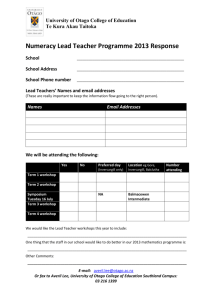
![the registration form [DOC format, 30KB].](http://s3.studylib.net/store/data/007326701_2-7aa061ae2787fe2d09dcfa408150476a-300x300.png)
